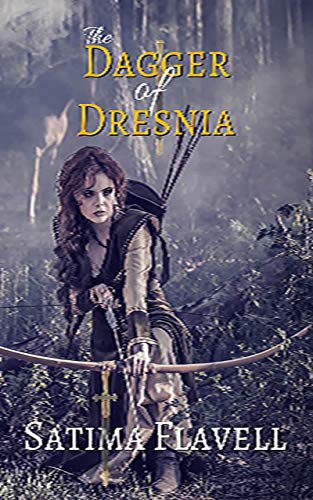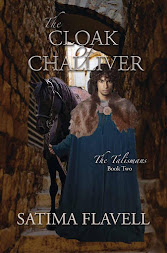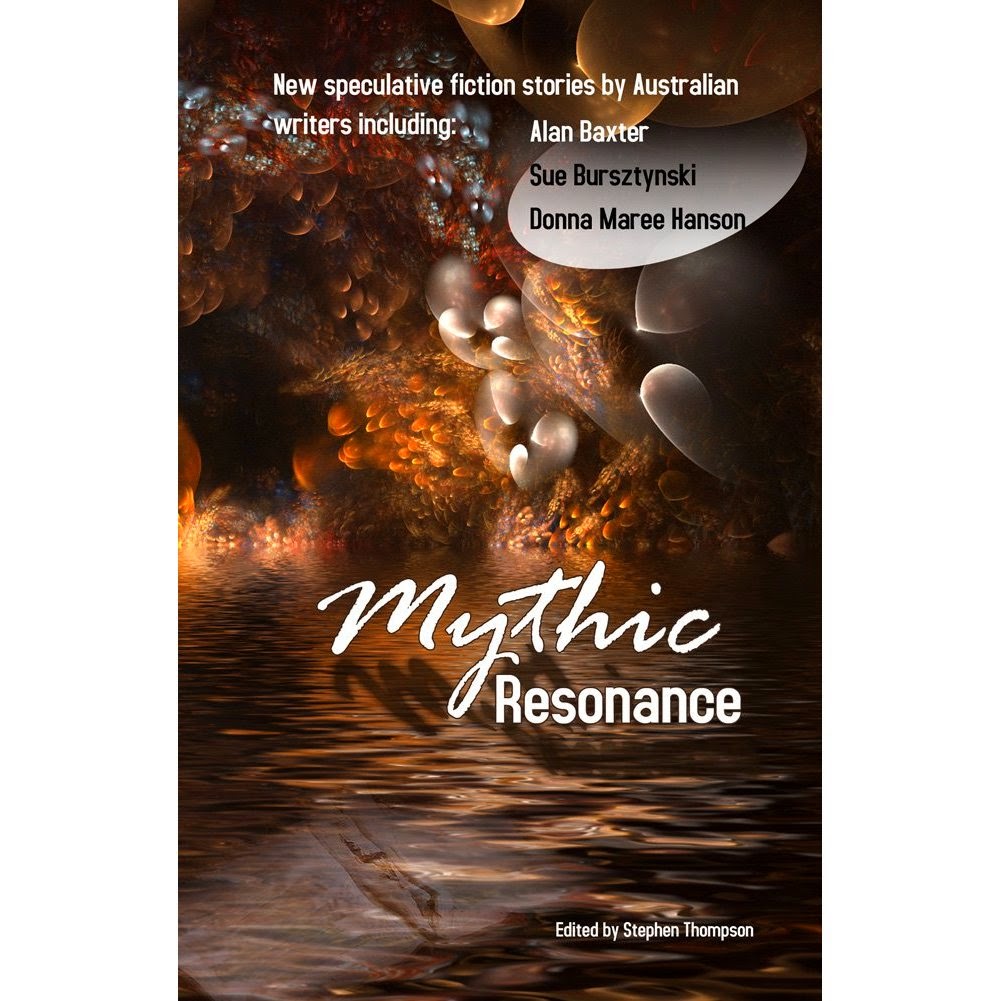About Me
- Satima Flavell
- Perth, Western Australia, Australia
- I am based in Perth, Western Australia. You might enjoy my books - The Dagger of Dresnia, the first book of the Talismans Trilogy, is available at all good online book shops as is Book two, The Cloak of Challiver. Book three, The Seer of Syland, is in preparation. I trained in piano and singing at the NSW Conservatorium of Music. I also trained in dance (Scully-Borovansky, WAAPA) and drama (NIDA). Since 1987 I have been writing reviews of performances in all genres for a variety of publications, including Music Maker, ArtsWest, Dance Australia, The Australian and others. Now semi-retired, I still write occasionally for the ArtsHub website.
My books
The first two books of my trilogy, The Talismans, (The Dagger of Dresnia, and book two, The Cloak of Challiver) are available in e-book format from Smashwords, Amazon and other online sellers. Book three of the trilogy, The Seer of Syland, is in preparation.I also have a short story, 'La Belle Dame', in print - see Mythic Resonance below - as well as well as a few poems in various places.
The best way to contact me is via Facebook at https://www.facebook.com/satimaflavell
Buy The Talismans
The first two books of The Talismans trilogy were published by Satalyte Publications, which, sadly, has gone out of business. However, The Dagger of Dresnia and The Cloak of Challiver are available as ebooks on the usual book-selling websites, and book three, The Seer of Syland, is in preparation.
The easiest way to contact me is via Facebook.
The Dagger of Dresnia

The Cloak of Challiver, Book two of The Talismans

Available as an e-book on Amazon and other online booksellers.
Mythic Resonance
Mythic Resonance is an excellent anthology that includes my short story 'La Belle Dame', together with great stories from Alan Baxter, Donna Maree Hanson, Sue Burstynski, Nike Sulway and nine more fantastic authors! Just $US3.99 from Amazon.
Got a Kindle? Check out Mythic Resonance. 
Follow me on Twitter
Share a link on Twitter
For Readers, Writers & Editors
- A dilemma about characters
- Adelaide Writers Week, 2009
- Adjectives, commas and confusion
- An artist's conflict
- An editor's role
- Authorial voice, passive writing and the passive voice
- Common misuses: common expressions
- Common misuses: confusing words
- Common misuses: pronouns - subject and object
- Conversations with a character
- Critiquing Groups
- Does length matter?
- Dont sweat the small stuff: formatting
- Free help for writers
- How much magic is too much?
- Know your characters via astrology
- Like to be an editor?
- Modern Writing Techniques
- My best reads of 2007
- My best reads of 2008
- My favourite dead authors
- My favourite modern authors
- My influential authors
- Planning and Flimmering
- Planning vs Flimmering again
- Psychological Spec-Fic
- Readers' pet hates
- Reading, 2009
- Reality check: so you want to be a writer?
- Sensory detail is important!
- Speculative Fiction - what is it?
- Spelling reform?
- Substantive or linking verbs
- The creative cycle
- The promiscuous artist
- The revenge of omni rampant
- The value of "how-to" lists for writers
- Write a decent synopsis
- Write a review worth reading
- Writers block 1
- Writers block 2
- Writers block 3
- Writers need editors!
- Writers, Depression and Addiction
- Writing in dialect, accent or register
- Writing it Right: notes for apprentice authors
Interviews with authors
My Blog List
-
Estelle Pinney books… - Here’s another author I’ve met at a Gold Coast Writers meeting. She talked about her book ‘A Net Full of Honey’ which I purchased on the day. Her character...1 hour ago
-
The Big Idea: A.D. Sui - Author A.D. Sui knows about the day-to-day experience of navigating the world with a disability, and in The Dragonfly Gambit, she brings some of that exper...2 hours ago
-
Veronica Speedwell, Pirates, Mermaids, and Houseplant Care on Sale! - *A Perilous Undertaking* *RECOMMENDED: A Perilous Undertaking by Deanna Raybourn is $2.99 as a KDD today! This is book two in the Veronica Speedwell seri...2 hours ago
-
The US South: A deadly front during World War II - The US South: A deadly front during World War II The US Army recently gave a full military funeral to Albert King, a Black soldier killed by a white mili...5 hours ago
-
5 Common Problems With Beginnings - *By Janice Hardy, @Janice_Hardy* *If your beginning isn't working, no one will get to the ending.* A novel’s beginning is under a lot of pressure. It has...6 hours ago
-
Vikings! ‘Tis But A Scratch: Fact & Fiction About the Middle Ages - In this episode of the podcast "'Tis But A Scratch": Fact & Fiction About the Middle Ages, co-hosts Richard Abels and his wife Ellen Abels explain who and ...6 hours ago
-
Flog a Pro: Would You Turn the First Page of this Bestseller? - Trained by reading hundreds of submissions, editors and agents often make their read/not-read decision on *the first page*. In a customarily formatted bo...6 hours ago
-
I promised photos from the trip - I feel like a slacker but I have been busy. There’s so much going on, so much to write about. We’ve been back six weeks. It feels like a short time and a l...9 hours ago
-
I promised photos from the trip - I feel like a slacker but I have been busy. There’s so much going on, so much to write about. We’ve been back six weeks. It feels like a short time and a l...9 hours ago
-
A To Z Blogging Challenge 2024 - Villains! - Peter Pettigrew - Peter Pettigrew is one of the villains of the Harry Potter series. He was at school with Harry’s parents and was one of the four Marauders, “Moony, Wor...11 hours ago
-
Mastering Blog Post Creation: 10 Essential Steps to Enhance Your Writing Process - The post Mastering Blog Post Creation: 10 Essential Steps to Enhance Your Writing Process appeared first on ProBlogger. It hits you like a TON of BRICKS!...11 hours ago
-
Edward Ashton - Edward Ashton is the author of the novels Mal Goes to War, Antimatter Blues, Mickey7 (now a motion picture directed by Bong Joon-ho and starring Robert Pat...1 day ago
-
Newsletter 16th April 2024 - Here’s a copy of my newsletter from April 16th, 2024. Sign up via my website to get newsletters directly to your inbox (and remember to check your Spam f...2 days ago
-
Are You Schrödinger’s Writer? Here’s How To Break Out Of This Destructive Mindset - Schrödinger’s Cat Versus Writers Schrödinger’s Cat is a thought experiment devised by the Austrian physicist Erwin Schrödinger, which he designed to illu...4 days ago
-
Art, Colonialism and Change by Stephanie Williams - If you move fast, you can just catch the fabulous exhibition *Entangled Pasts 1768-Now, Art, Colonialism and Change* at the Royal Academy in London which ...6 days ago
-
The Great Discworld Retrospective No. 13: Small Gods - There’s a phenomenon known as “capturing lightning in a bottle” that describes the sensation of being in a particular place at precisely the right time to ...1 week ago
-
'The Tic-Toc Boy of Constantinople' in the revered The Conversation as one of five "Australian literary works of particular relevance to national conversations about AI" - I've always respected and admired *The Conversation, *so it is a humbling privilege to have 'The Tic-Toc Boy of Constantinople' written about in *The Con...1 week ago
-
Ourselves: 100 Micro Memoirs - I am lucky enough to have a non-fiction piece, ‘Helicopter Parents’, in this new release from Night Parrot Press, Ourselves: 100 Micro Memoirs. This is the...1 week ago
-
The Dead Boys Detective Agency. It is a very silly name. But accurate. - April 25th. DEAD BOY DETECTIVES. It's really good -- it's funny, it's smart, it's scary, and it even has a few familiar faces... (And no, you won...2 weeks ago
-
#3 WEP GET TOGETHER - APRIL 2024 - IT'S THE A - Z CHALLENGE! - Hi WEPpers and friends! Already time for out third Get Together. Life is flashing by! Hit us with your news, writerly or personal. We'd love to hear fro...2 weeks ago
-
Henry of Lancaster and His Children - The close bonds which Edward II's cousin Henry of Lancaster, earl of Lancaster and Leicester, forged with his children have fascinated me for a long time...2 weeks ago
-
Urbenville Adventure - Wow, Urbenville, what an adventure! An approach so tough I nearly threw up. Climbs so hard I’m still hurting. Plants so vicious, one grass-spike tore my co...2 weeks ago
-
Researching the birth of the first domestic violence refuge - Read a researcher's journey exploring the first few years of Chiswick Women's Aid. The post Researching the birth of the first domestic violence refuge ...4 weeks ago
-
Trip to Brazil 2024 - Landing in the Megalopolis of Sao Paulo On February 7th I flew to Sao Paulo, Brazil to start a 17 day teachi...1 month ago
-
Photo Parade 2023 - A bit of fun at the beginning of the new year. I’m following several German travel blogs, and that way came across the annual Photo Parade (Fotoparade) on ...3 months ago
-
Happy Public Domain Day 2024, the end of copyright for 1928 works - My annual reminder that January 1st is Public Domain Day, and this year copyright has ended for books, movies, and music first published in the U.S. in 192...3 months ago
-
The White Horse Band - Live Blues/Rock - 31 March 2023 Hi All, Time for some LIVE Video Music from me… (as opposed to my original stuff)…. I got into a blues/rock band for a one off gig at ...4 months ago
-
Konrath Thanksgiving - Black Friday - Cyber Monday Kindle Bundle Sale - *Get all of my ebook box sets on Amazon Kindle for 99 cents each, November 23 - 28.* *THAT'S 33¢ PER BOOK!* Almost my entire backlist of fifty-four ebooks...5 months ago
-
Questions from year 9 students - Recently – actually, not very recently but I somehow forgot to write this sooner – I did what has become an annual online Q&A with the Year 9 girls at Bedf...5 months ago
-
On Ohio, and the novels, and the new class - Just small news here. The new class is finished in first draft, and I’m now (and for the first time ever) doing the complete course bug-hunt and clean-up B...6 months ago
-
Big disruption hit book publishing before AI showed up - Publishers Weekly recently hosted a stimulating and smart online session about AI and publishing, thanks to the organizing and moderating skills of Peter...6 months ago
-
Flogometer 1180 for Christian—will you be moved to turn the page? - Submissions sought. Get fresh eyes on your opening page. Submission directions below. The Flogometer challenge: can you craft a first page that compels me ...8 months ago
-
Storny Weather - I've just been out fixing up the damage from last night's storm. This is pretty much the first time I've been able to spend much time outside and do any...8 months ago
-
#347 - I've been querying agents for the last 6-months and have over 50 rejections. I'm not sure if my novel isn't very interesting/sellable or if my query let...8 months ago
-
Parody - The other day, for the first time in a very long time, I heard the Barbie Song. So, being me, I decided to parody it, in hour of Alianore Audley and *The...8 months ago
-
Parody - The other day, for the first time in a very long time, I heard the Barbie Song. So, being me, I decided to write a parody. Hope you like it! *Hiya, Ali...8 months ago
-
To Live and Love - To live and love for the both of us Ten years ago today I made that vow I've struggled in the decade since Not always knowing exactly how Ten years you've...9 months ago
-
“It’s Random” – a random scribble - “Why am I even here? It’s random. No Divine Thing. No actual “purpose” except what we make of it. I haven’t made anything of it except to be restless, to a...9 months ago
-
#MemorialDay, remembering a female patriot ancestor - *© 2022 Christy K Robinson* We are taught stories about heroic men who gave their lives to bring independence and liberty to their families, friends--and...10 months ago
-
A tale of two titles - I have done something notably foolish. Which is perhaps nothing new, though the circumstances on this occasion are unusual. To whit, I am publishing two bo...1 year ago
-
Poem: If Wishes were horses - A team of horses racing toward me Brown like the uniforms of soldiers fortressing me around Speckled like a found family, salt of the earth Whit...1 year ago
-
another review for the Christmas Maze - *The Christmas Maze by Danny Fahey – a Review by David Collis* Why do we seek to be good, to make the world a better place? Why do we seek to be ethi...1 year ago
-
-
-
Children’s Rights QLD Ambassador - Children’s Rights QLD appointed Karen Tyrrell (me) Ambassador for Logan City, ahead of Children’s Week, 24-29 Oct 2022. I’m an award-winning child-empowe...1 year ago
-
ANWERING THE CALL: LESSONS FROM THE THRESHOLD - NEXT STORY SANCTUARY "Anwering the Call: Lessons from the Threshold" Sept. 20, 7 pm eastern $30 Online Whether you're starting a project, a school year, ...1 year ago
-
The Green House, Chapters 1-4 (Revised) - [Dear Reader: Having refined my intentions for this novel based on a lot of recent thinking about life and art, I have restructured and revised the first f...1 year ago
-
Publishing Contracts 101: Beware Internal Contradications - It should probably go without saying that you don't want your publishing contract to include clauses that contradict one another. Beyond any potential l...1 year ago
-
Tara Sharp is back and in audio book - SHARP IS BACK! Marianne Delacourt and Twelfth Planet Press are delighted to announce the fifth Tara Sharp story, a novella entitled RAZOR SHARP, will be ...1 year ago
-
Website Update - My website www.stephendedman.com has been updated, with details of my latest books; please check it out!2 years ago
-
Non-Binary Authors To Read: July 2021 - Non-Binary Authors To Read is a regular column from A.C. Wise highlighting non-binary authors of speculative fiction and recommending a starting place fo...2 years ago
-
ATTENTION: YOU CAN’T LOG IN HERE - Hey YOU! This isn’t the forum. You’re trying to login to the Web site. THE FORUMS ARE HERE: CLICK THIS The post ATTENTION: YOU CAN’T LOG IN HERE a...2 years ago
-
I'M INSIDE A SHORT STORY!! - Ok everyone, you have to read this very short short story. Firstly because it is good, (check out the Bligh story within it too), but also because I'm ...2 years ago
-
Grandmother Dragon Forever - It feels like centuries since the last time I wrote something for the Dragon Cave. Only something of great importance would drag me out of my retirement...3 years ago
-
-
What communicates power? - Well, I have to say, I wasn't expecting to get this far behind on my reports on the show, but the launch month was very busy, and then the next month turne...4 years ago
-
The Legendary Game Pac-Man Has No Meaning. - [image: The Legendary Game Pac-Man Has No Meaning.] The Legendary Game Pac-Man Has No Meaning. Let's take a look at how this word came about. Actually, P...4 years ago
-
Readers Notice and They Care - Readers care about story details and they care about characters. Both last night and this afternoon I had conversations with readers upset about the way au...4 years ago
-
Review of Verdi's MacBeth (WA Opera) - *Our president, Frances Dharmalingham, has written a critique of a recent visit to the opera: Verdi’s ‘Macbeth’.* At Christmas 2018, my family’s gift to ...4 years ago
-
Breakout 3: tips for engaging your audience - Tips for engaging your audience: how to improve presentation, public speaking confidence and presence on stage, no matter how small the stage is. Present...4 years ago
-
The Trains Don't Stop Here - It's been a long, long time since my last blog post. One of the main reasons for this – apart from life being way too busy in general – is that, in my dwin...4 years ago
-
Portrait of a first generation freed African American family - Sanford Huggins (c.1844–1889) and Mary Ellen Pryor (c.1851–1889), his wife, passed the early years of their lives in Woodford County, Kentucky, and later...4 years ago
-
Revisiting the Comma Splice - One of the difficulties as an editor, particularly when working with fiction, is to know when to be a stickler for the rules. For some people this is not a...4 years ago
-
New releases - SFFBookBonanza - StoryOrigin - SciFi and Fantasy Book Sale - New Releases – Jul 2019 The latest and greatest new releases in Science Fiction and Fantasy books! New releases July 2019 99 cent sale - July 22nd - 28t...4 years ago
-
Assassin’s Apprentice Read Along - This month, in preparation for the October release of the Illustrated 25th Anniversary edition of Assassin’s Apprentice, with interior art by Magali Villan...4 years ago
-
STOLEN PICTURE OPTIONS TELEVISION RIGHTS TO BEN AARONOVITCH’S RIVERS OF LONDON - *STOLEN PICTURE OPTIONS TELEVISION RIGHTS TO BEN AARONOVITCH’S * *RIVERS OF LONDON* *London, UK: 29April 2019*: Nick Frost and Simon Pegg’s UK-based ...4 years ago
-
A Movie That No Writer Should See Alone - Really. REALLY. Trust me on this. particularly since this film, ‘Can you ever forgive me?’, is based on a ‘True story’ – and too many writers will see too...5 years ago
-
Review: Trace: who killed Maria James? - [image: Trace: who killed Maria James?] Trace: who killed Maria James? by Rachael Brown My rating: 5 of 5 stars Absolutely jaw-dropping, compelling readin...5 years ago
-
Dance Photo Shoots - Photo Session Planning & Preparation Have you ever wanted to do a photo shoot for dance but have been a little unsure about how and what really happens? ...5 years ago
-
On Indefinite Hiatus - (Which I pretty much have been from this site for a while already, but for real now.) You can find most archive content through the On Writing page, and li...6 years ago
-
2017 Ditmar Winners Announced - Over the Queen’s Birthday weekend, spec fic fans gathered for Continuum 13: Triskaidekaphilia. Continuum is always a great convention, and this year it was...6 years ago
-
Writing about the Crusades and talking about a "meddlesome priest" - The Middle Ages are in the news again, so here is a roundup of recent news articles. We start with three good reads from historians talking about the crusa...6 years ago
-
The One and the Many – every Sunday - My first serious girlfriend came from good Roman Catholic stock. Having tried (and failed) to be raised as a Christian child and finding nothing but lifele...6 years ago
-
A Shameless Plug Ian Likes: Bibliorati.com - A little-known fact is that I once had a gig reviewing books for five years. It was for a now-defunct website known as The Specusphere. It was awesome fun:...7 years ago
-
Book Review - Nobody by Threasa Meads - Available from BooktopiaThe subtitle for this work is *A Liminal Autobiography*. Liminal: 1. relating to a transitional or initial stage of a process. 2...7 years ago
-
A whole 'nother year-and-a-bit - Well, we have let this blog slip, haven't we? I guess Facebook has taken over from blogs to a very large degree, but I think there is still a need for blo...7 years ago
-
2017 Potential Bee Calendar – & ladybirds and butterflies - Bees on flowers – all sorts of flowers (& bees) – and lady birds and butterflies. There were hundreds (literally) of photos to choose from. This is a small...7 years ago
-
What is dyslexia? - *" **The bottob line it thit it doet exitt, no bitter whit nibe teottle give it(i.e ttecific lierning ditibility, etc) iccording to Thilly Thiywitz ( 2003)...8 years ago
-
Rai stones - *(Paraphrased from Wikipedia)*: Rai stones were, and in some cases are still, the currency of the island once called Yap. *They are stone coins which at th...10 years ago
-
Cherries In The Snow - This recipe is delicious and can also be made as a diet dessert by using fat and/or sugar free ingredients. It’s delicious and guests will think it took ...11 years ago
-
Al Milgrom’s connection to “Iron Man” - Via the Ann Arbor online newspaper - I felt it was worth repeating as a great example of Marvel doing the right thing by a former employee and without the ...13 years ago
Favourite Sites
- Alan Baxter
- Andrew McKiernan
- Bren McDibble
- Celestine Lyons
- Guy Gavriel Kay
- Hal Spacejock (Simon Haynes)
- Inventing Reality
- Jacqueline Carey
- Jennifer Fallon
- Jessica Rydill
- Jessica Vivien
- Joel Fagin
- Juliet Marillier
- KA Bedford
- Karen Miller
- KSP Writers Centre
- Lynn Flewelling
- Marianne de Pierres
- Phill Berrie
- Ryan Flavell
- Satima's Professional Editing Services
- SF Novelists' Blog
- SF Signal
- Shane Jiraiya Cummings
- Society of Editors, WA
- Stephen Thompson
- Yellow wallpaper
Blog Archive
Places I've lived: Manchester, UK

Places I've lived: Gippsland, Australia

Places I've lived: Geelong, Australia

Places I've lived: Tamworth, NSW

Places I've Lived - Sydney

Sydney Conservatorium - my old school
Places I've lived: Auckland, NZ

Places I've Lived: Mount Gambier

Blue Lake
Places I've lived: Adelaide, SA

Places I've Lived: Perth by Day

From Kings Park
Places I've lived: High View, WV

Places I've lived: Lynton, Devon, UK

Places I've lived: Braemar, Scotland

Places I've lived: Barre, MA, USA

Places I've Lived: Perth by Night

From Kings Park
Versatile Blogger Award
Search This Blog
Sunday 25 July 2010
Authorial voice, passive writing and the passive voice
How do you like my new-look blog? Kudos to my clever son Scott over at ManeyActs.
I've decided to import some old posts from the WordPress blog that I no longer use, and as Blogger won't let me import the lot in date order, I shall copy and paste them one by one. Here's one I posted in March of this year:
On sites that offer writing advice one sometimes reads instruction that confuses “passive writing” with “passive voice”. We see this among critiquers in writing groups as well, and it’s a source not just of confusion but also of misinformation.
I think there are two sources for this confusion. We often read that a writer needs to develop his or her own “Voice”. (I’ll capitalise this hereafter, to distinguish it from the other meaning of the word, which I’ll deal with farther down.)
“Voice” in this context really refers to those distinctive elements of a writer’s style that remind us of who is writing. If we look at authors of bygone days, Voice is not hard to see. Charles Dickens, for instance, had a distinctive Voice. So did Rudyard Kipling and DH Lawrence. In fact, pick up a work by any well-known author active before about 1980 and if you’ve read a few of that author’s books you will probably recognise the Voice straight away, because it did not vary much from book to book within that author’s oeuvre.
Few authors today have that kind of truly distinctive Voice. This is, I think, because of the popularity of the so-called “deep third” (AKA tight third or close third) Point-of-View (POV). It is currently fashionable for authors to hide behind their characters, giving the reader a seamless experience in which the author almost “channels” the POV character. In speculative fiction, two authors who demonstrate remarkable mastery of the deep third are Joe Abercrombie and Margo Lanagan. It is easy to lose oneself in their characters; to feel the character’s sensations and emotions and even to feel as if one is thinking that character’s thoughts. The author’s Voice and the voice of the POV character become one.
Some other authors use the close third only for moments of high tension and drama, retaining their own voice for narrative passages. Guy Gavriel Kay’s work is largely written in this style.
That more obvious, capital-V voice found in authors of past decades is easily confused with another sense of voice – passive writing. If a writer employs a lot of unnecessary auxiliary verbs (forms of “to be” and “to have” as part of an action, such as “He was running”) and constantly uses weak verbs such as walk and go (or went) people say the writing is passive. It’s only a short step from here to thinking that the writer has a “passive” Voice, and here’s where the trouble really starts, because the expression “passive voice” has a clearly defined grammatical meaning.
The “passive voice” as opposed to the “active voice” means using a verb without close reference to the doer of the action, as in, for example, “The ball was thrown by John” instead of “John threw the ball”. The giveaway is that little word “by”. A verb in the passive voice is followed by a preposition, most commonly “by” or “to” (as in “The award was given to Jenny”).
Let's look at examples of the three matters under discussion here – authorial voice, passive writing and the passive voice:
1. An author’s voice (I'll stop capitalising it now you 've got the picture!)
Here is Dickens’s famous opening of A Tale of Two Cities:
It was the best of times, it was the worst of times, it was the age of wisdom, it was the age of foolishness, it was the epoch of belief, it was the epoch of incredulity, it was the season of Light, it was the season of Darkness, it was the spring of hope, it was the winter of despair, we had everything before us, we had nothing before us, we were all going direct to heaven, we were all going direct the other way – in short, the period was so far like the present period, that some of its noisiest authorities insisted on its being received, for good or for evil, in the superlative degree of comparison only.
The opening gives us an excellent feel for Dickens’s very distinctive (authorial) voice.
2. Passive writing
Here’s a passage I’ve just made up:
I was walking along the road, having just been to the dentist, when I was hit from behind by a cricket ball that had been thrown by a schoolboy. I had been intending to go to visit my mother, but the blow to my head gave me such a migraine that I found myself thinking that perhaps I should be going straight home to lie down.
That is passive writing. We don’t get any feel for the action or for the character’s feelings and sensations because we are separated from them by wases and –ing words – and one example of the passive voice! Can you see where it is?
3. The passive voice
Yup, that’s right: “I was hit from behind by a cricket ball” is in the passive voice, grammatically speaking. The passive voice is best avoided in fiction writing because it is frequently found as an element of passive writing.
But don’t get the terms mixed up. Passive writing is not always in the passive voice. Passive writing, as I’ve said above, is characterised by too many auxiliary verbs, weak verbs and probably weak nouns as well. It may or may not include use of the passive voice.
And not all writing that uses auxiliary verbs is passive, either. For instance “The pretty girl was dancing when I first saw her” uses the auxiliary “was” to indicate the past continuous tense. Some critiquers might try to persuade you to replace it with the simple past – “The pretty girl danced when I first saw her”. They would be wrong, because the simple past tense in that case would be incorrect and somewhat ambiguous. It might suggest, for example, that the pretty girl started to dance because I saw her!
What I’m trying to get across here is don't confuse authorial voice with the passive voice and especially don't confuse passive writing with the passive voice. “The pretty girl was dancing when I first saw her”, and, for instance, “The pretty girl will be dancing next time I see her” are certainly not in the passive voice, and, used correctly, are not necessarily examples of passive writing, either. They are perfectly legitimate uses of continuous forms of the verb “to dance”.
We are fortunate in having so many ways to express things in English, and the continuous tenses have their place. The skill lies in knowing when you can get away without using them, rather than making blanket statements about "passive writing" or worse, confusing them with the passive voice.
I've decided to import some old posts from the WordPress blog that I no longer use, and as Blogger won't let me import the lot in date order, I shall copy and paste them one by one. Here's one I posted in March of this year:
On sites that offer writing advice one sometimes reads instruction that confuses “passive writing” with “passive voice”. We see this among critiquers in writing groups as well, and it’s a source not just of confusion but also of misinformation.
I think there are two sources for this confusion. We often read that a writer needs to develop his or her own “Voice”. (I’ll capitalise this hereafter, to distinguish it from the other meaning of the word, which I’ll deal with farther down.)
“Voice” in this context really refers to those distinctive elements of a writer’s style that remind us of who is writing. If we look at authors of bygone days, Voice is not hard to see. Charles Dickens, for instance, had a distinctive Voice. So did Rudyard Kipling and DH Lawrence. In fact, pick up a work by any well-known author active before about 1980 and if you’ve read a few of that author’s books you will probably recognise the Voice straight away, because it did not vary much from book to book within that author’s oeuvre.
Few authors today have that kind of truly distinctive Voice. This is, I think, because of the popularity of the so-called “deep third” (AKA tight third or close third) Point-of-View (POV). It is currently fashionable for authors to hide behind their characters, giving the reader a seamless experience in which the author almost “channels” the POV character. In speculative fiction, two authors who demonstrate remarkable mastery of the deep third are Joe Abercrombie and Margo Lanagan. It is easy to lose oneself in their characters; to feel the character’s sensations and emotions and even to feel as if one is thinking that character’s thoughts. The author’s Voice and the voice of the POV character become one.
Some other authors use the close third only for moments of high tension and drama, retaining their own voice for narrative passages. Guy Gavriel Kay’s work is largely written in this style.
That more obvious, capital-V voice found in authors of past decades is easily confused with another sense of voice – passive writing. If a writer employs a lot of unnecessary auxiliary verbs (forms of “to be” and “to have” as part of an action, such as “He was running”) and constantly uses weak verbs such as walk and go (or went) people say the writing is passive. It’s only a short step from here to thinking that the writer has a “passive” Voice, and here’s where the trouble really starts, because the expression “passive voice” has a clearly defined grammatical meaning.
The “passive voice” as opposed to the “active voice” means using a verb without close reference to the doer of the action, as in, for example, “The ball was thrown by John” instead of “John threw the ball”. The giveaway is that little word “by”. A verb in the passive voice is followed by a preposition, most commonly “by” or “to” (as in “The award was given to Jenny”).
Let's look at examples of the three matters under discussion here – authorial voice, passive writing and the passive voice:
1. An author’s voice (I'll stop capitalising it now you 've got the picture!)
Here is Dickens’s famous opening of A Tale of Two Cities:
It was the best of times, it was the worst of times, it was the age of wisdom, it was the age of foolishness, it was the epoch of belief, it was the epoch of incredulity, it was the season of Light, it was the season of Darkness, it was the spring of hope, it was the winter of despair, we had everything before us, we had nothing before us, we were all going direct to heaven, we were all going direct the other way – in short, the period was so far like the present period, that some of its noisiest authorities insisted on its being received, for good or for evil, in the superlative degree of comparison only.
The opening gives us an excellent feel for Dickens’s very distinctive (authorial) voice.
2. Passive writing
Here’s a passage I’ve just made up:
I was walking along the road, having just been to the dentist, when I was hit from behind by a cricket ball that had been thrown by a schoolboy. I had been intending to go to visit my mother, but the blow to my head gave me such a migraine that I found myself thinking that perhaps I should be going straight home to lie down.
That is passive writing. We don’t get any feel for the action or for the character’s feelings and sensations because we are separated from them by wases and –ing words – and one example of the passive voice! Can you see where it is?
3. The passive voice
Yup, that’s right: “I was hit from behind by a cricket ball” is in the passive voice, grammatically speaking. The passive voice is best avoided in fiction writing because it is frequently found as an element of passive writing.
But don’t get the terms mixed up. Passive writing is not always in the passive voice. Passive writing, as I’ve said above, is characterised by too many auxiliary verbs, weak verbs and probably weak nouns as well. It may or may not include use of the passive voice.
And not all writing that uses auxiliary verbs is passive, either. For instance “The pretty girl was dancing when I first saw her” uses the auxiliary “was” to indicate the past continuous tense. Some critiquers might try to persuade you to replace it with the simple past – “The pretty girl danced when I first saw her”. They would be wrong, because the simple past tense in that case would be incorrect and somewhat ambiguous. It might suggest, for example, that the pretty girl started to dance because I saw her!
What I’m trying to get across here is don't confuse authorial voice with the passive voice and especially don't confuse passive writing with the passive voice. “The pretty girl was dancing when I first saw her”, and, for instance, “The pretty girl will be dancing next time I see her” are certainly not in the passive voice, and, used correctly, are not necessarily examples of passive writing, either. They are perfectly legitimate uses of continuous forms of the verb “to dance”.
We are fortunate in having so many ways to express things in English, and the continuous tenses have their place. The skill lies in knowing when you can get away without using them, rather than making blanket statements about "passive writing" or worse, confusing them with the passive voice.
Subscribe to:
Post Comments (Atom)
































2 comments:
Nice site Satima, not being a writer, I didn't read the whole post, but I do like the look of it all.
Thanks, Jo, I'm glad you like it!